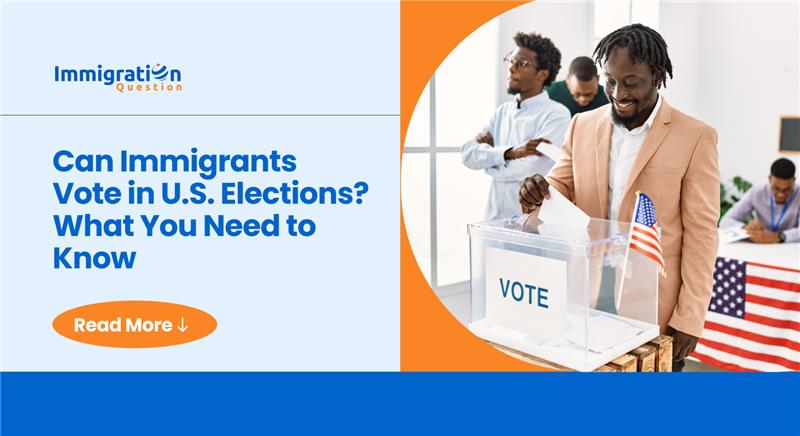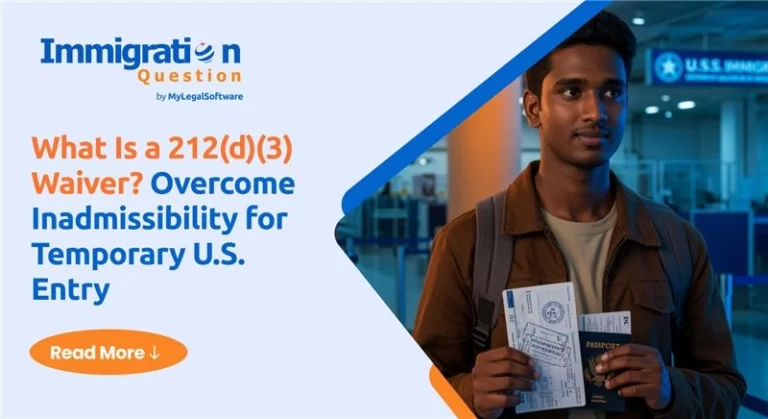Can Immigrants Vote in US Elections?
According to the U.S. Census Bureau, over 46 million immigrants are currently in the country, and 24.5 million are naturalized. Generally, naturalized citizens have the right to vote in the U.S. elections. Immigrants in the United States must understand how their status determine the rights they hold.
This blog explains voting rights for immigrants in the U.S., examining the history, current laws, and common questions on this topic.
Does the U.S. Constitution Allow Immigrants to Vote?
The U.S. Constitution does not explicitly grant voting rights to noncitizens. Instead, there are voting laws as federal guidelines to govern national elections.
Historically, some states allowed noncitizens to vote, but the government gradually eliminated these practices. By 1924, all states had banned noncitizens from voting in federal elections. In 1996, the Illegal Immigration Reform and Immigrant Responsibility Act further reinforced this prohibition, imposing criminal penalties on noncitizens caught voting.
Who Is Eligible to Vote in the U.S.?
You must be a U.S. citizen to vote in federal, state, and local elections. Here are the general eligibility requirements:
- U.S. Citizenship: Only U.S. citizens, including naturalized citizens, can vote in federal elections.
These citizens are also allowed to vote:
- U.S. citizens living abroad.
- Dual citizens residing in the U.S. or abroad.
- Absentee citizens born abroad who have never lived in the U.S. (eligibility depends on parents’ last residence).
Residency: Voters must meet state-specific residency requirements. Homeless citizens can still qualify to vote.
Age: Voters must be 18 years or older by Election Day. Some states allow 17-year-olds to vote in primaries if they will be 18 by the general election. Voter Registration: Those who register to vote before their state’s deadline, except for North Dakota, which does not require voter registration.
Who Is Restricted from Voting?
Non-citizens, including permanent residents (green card holders), are generally prohibited from voting in federal, state, and most local elections. These restrictions apply to:
Noncitizens: Federal law prohibits all noncitizens from voting in national elections, and most states extend this rule to state and local elections.
People with felony convictions: Voting rights for convicted people with felony convictions vary by state. Some states permanently disenfranchise people with felony convictions, while others restore voting rights after completing their sentence.
U.S. Citizens in Territories: Residents of U.S. territories like Puerto Rico, Guam, and American Samoa cannot vote in presidential elections.
Mentally Disabled Individuals: In some states, people with certain mental disabilities are restricted from voting.
Can Immigrants Vote in US Elections?
Naturalized citizens can participate in all government-level elections. However, noncitizen immigrants, including permanent residents and those in the U.S. on temporary visas, are generally prohibited from voting in the polls.
In 1996, the U.S. Congress passed a law prohibiting noncitizens from voting in federal elections, including those for the U.S. House, U.S. Senate, and presidential races. This law, however, does not apply to elections for state and local offices.
As of September 2024, no state constitutions explicitly allowed noncitizens to vote in state or local elections. However, some local jurisdictions in California, Maryland, Vermont, and Washington, D.C. allow noncitizens to vote in local elections, such as school board races. These allowances are rare and strictly regulated to avoid conflicts with federal laws.
Have Immigrants Ever Been Allowed to Vote in the U.S.?
Historically, some U.S. states permitted noncitizens to vote, particularly in the 19th and early 20th centuries, when states sought to encourage immigrant participation in local governance.
However, states began restricting this right as national security concerns and other political considerations grew. By 1924, all states had rescinded noncitizen voting rights at the federal level, and in 1996, Congress codified noncitizen voting restrictions with criminal penalties.
Can people without papers Vote in the U.S.?
People without papers cannot vote in U.S. elections. The Illegal Immigration Reform and Immigrant Responsibility Act of 1996 explicitly prohibits noncitizens, including undocumented immigrants, from voting in federal elections. The penalties for illegal voting include up to one year in prison, fines, and possible deportation.
Measures Against Noncitizen Voting
The standard practices to prevent noncitizens in the U.S. from voting include:
Registration Forms: All registrants must affirm U.S. citizenship, with penalties for perjury, though documentary proof is not always required.
Regular Audits: States cross-reference voter rolls with citizenship and immigration records to identify ineligible individuals.
Penalties for Noncitizen Voting: Federal law imposes harsh penalties on noncitizens who attempt to vote, including imprisonment, fines, and deportation.
Answering the commonly asked question, “Can immigrants vote in U.S.?” depends on certain factors. Only immigrants turned U.S. citizens can participate in the elections, with minimal exceptions for local elections in a few jurisdictions. Accidental violations can lead to severe consequences.
Immigration policies and voting laws are subject to change. Immigrants must stay informed through reliable resources and consult seasoned immigration lawyers to ensure compliance.
About Immigration Question
Immigration Question is a revolutionary platform that connects immigration attorneys to people who have immigration-related enquiries. We provide guidance on U.S. visas, citizenship, and green cards, keep you informed with the latest immigration news, and foster a knowledgeable community for support and insights.






